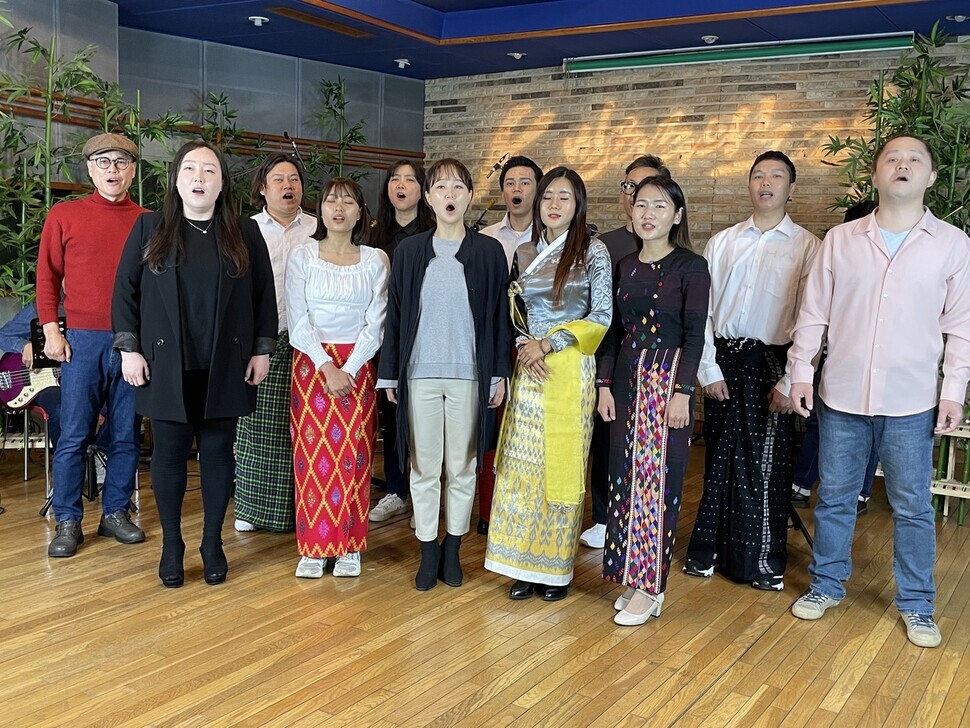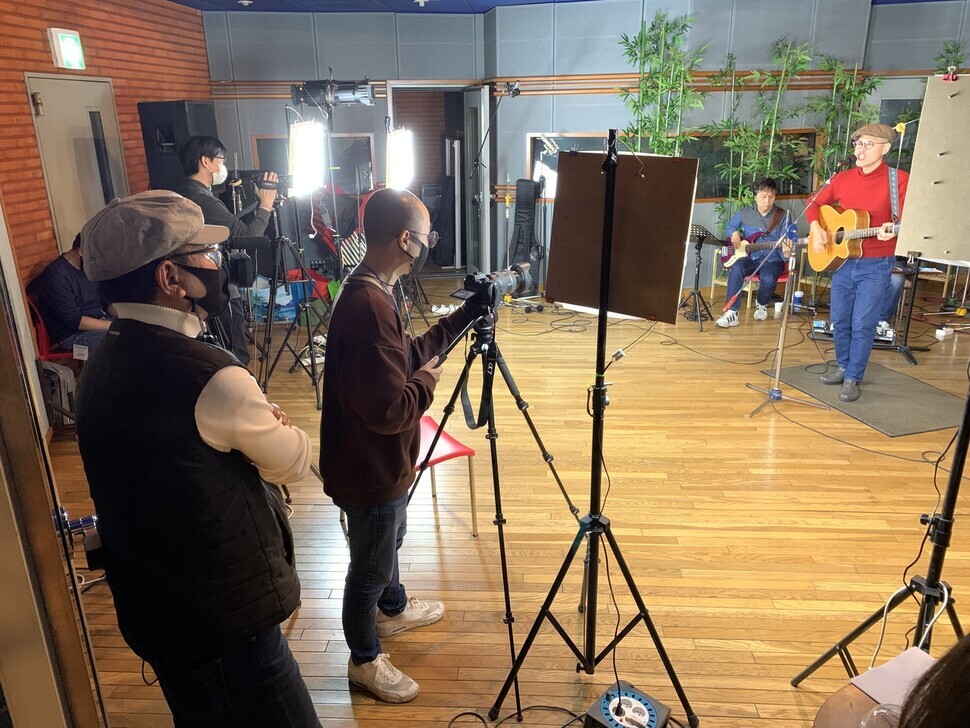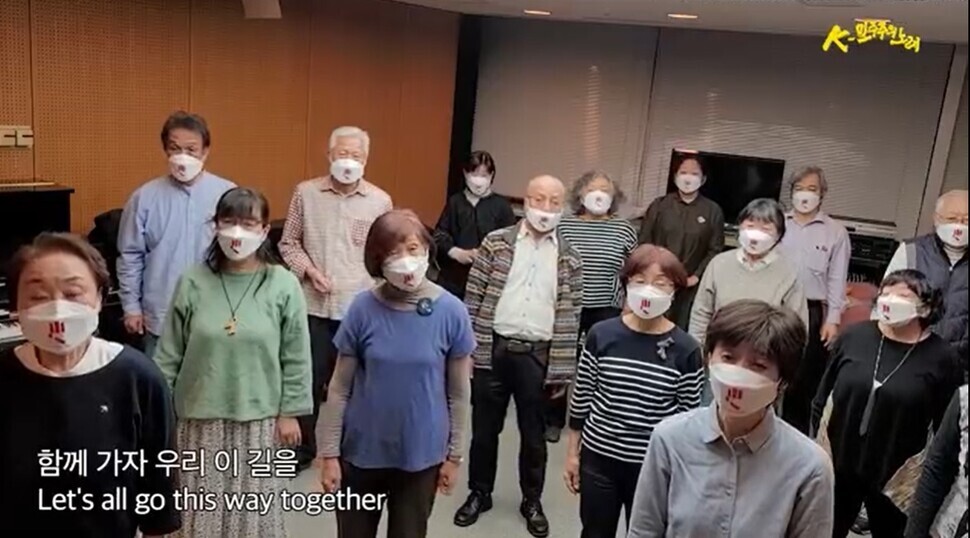hankyoreh
Links to other country sites 다른 나라 사이트 링크
Korean protest songs transcend borders to become global anthems of resistance

"I was deeply moved when I saw the scenes of democracy activists singing [Korean] resistance songs in Hong Kong and Myanmar. This is why I translated the lyrics of these songs into English and made them into videos to share Korean democracy with people around the world.”
This is how Son Byeong-hwi, chairman of the Seoul People’s Art Council, explained the intention behind his “The Songs of K-Democracy Festival 2021” video. The video was shared on Dec. 10 on the YouTube channels of Son and the council.
Son is a famed Korean folk singer who started his career as a member of the college troupe The Homeland and the Youth (Jogukgwa Cheongchun) in 1993, and has released eight albums in total.
He first extolled the excellence of Korea’s democracy. “That our social system is faring well amid the pandemic illustrates the power our society has accumulated by achieving democratization as well as industrialization,” he said. “I’ve heard that the world highly appraises not only Korea’s economy, but its democracy as well.”
This is why he has chosen to introduce the songs of what he calls K-democracy at a time when K-pop, as represented by BTS, and K-content such as “Parasite” (2019) and “Squid Game” have touched off global crazes.

The video features 10 songs that were sung by the people as they marched in the streets during Korea’s democratization movement, including “Marched for the Beloved” and “With a Burning Thirst.” Some songs are performed by Son himself, along with Moon Jin-o, Son Hyun-sook, Ryoo Geum-shin, Yeon Young-seok, Song Soon-kyu and the acapella group Acacia. The video features subtitles that include English translations of the protest songs.
But songs are only one part of the festival. Dance performances, paintings, photographs, and poetry appear on screen, accompanying the songs to add extra layers to the experience. In between sets, actors Kim Kyung-rak and Jang Yong-cheol recite poems by Kim Nam-ju and Shin Dong-yeop, while dancers
have also been added to accompany the songs to add extra layers to the experience. Actors Kim Kyung-rak and Jang Yong-cheol also recited poems by Kim Nam-ju and Shin Dong-yeop, while dancers Lee Sam-hun and Yang Hye-kyung gave dance performances.
The video opens with “March for the Beloved” (sometimes translated as “Marching for our Beloved”) being sung by a choir of students from Myanmar. Images of the people of Myanmar being brutally trampled in their struggle for democratization lead seamlessly into photos of Korea’s own democratization movement in May 1980 in Gwangju.
In February, the Seoul People's Art Council sent a video of this song sung by dozens of singers and actors to Myanmar in support of the Myanmar democratization movement. This time around, the song was sung by international students from Myanmar who supported the democratization movement in their home country while studying in Korea.
“Let’s All Go This Way Together,” often sung at scenes where solidarity is needed, also works as a useful tool to reflect on the memories of the democratization protest sites. The Japanese choir Irosora Gassyodan — meaning “The Rise Up Choir” — sings the first verse of the song in Korean. Hiroki Yamada, director of the choir, said, "Korean democracy is always our hope. In the future, we’ll continue to sing for democracy together with all our Korean family.”
Son said, “Irosora is a choir that sings mainly Korean and Japanese protest songs. I asked them to take part [in the video] given the long-standing relationship of collaboration I have with them.”

During the performance of “With a Burning Thirst,” actor Kim Kyung-rak reads the poem “Letter” by Kim Nam-ju.
“The song itself was based on a poem from the Yushin era in the 1970s. Young people who left due to having to cope with the expectations of their families walked the path of hardship, forgoing their own stability and that of their family — especially their mothers. The poet Kim Nam-ju also often wrote letters to his mother from prison. I think the sentiments of both the poem and the poet, and the person he is confessing to (his mother) go well with the song,” Son said.
During the performance of the song “In the Wilderness” Shin Dong-yeop's poem “Away with the husk” is read.
“He is a fantastic poet. The poem refers to moving beyond the contradictions of division, to breaking through narrow perspectives, and going into the wild but vast wilderness,” Son says.
Dance is also featured. In the song “Desperately,” Yang Hye-kyung dances at platform 9-4 of Guui Station on Seoul Subway Line 2. This is the place where a young irregular worker in his 20s was killed in May 2016 after being struck by a train while working on the safety doors.
During the performance of “Cheonggyecheon 8-ga,” Lee Sam-hun dances on the Jeon Tae-il Bridge that straddles the titular stream.
“Yeon Young-seok, who wrote and performed ‘Desperately’ is a singer-songwriter who mainly works in the labor field. The desperation is well embedded in the lyrics like ‘[I want a world] where what I have is just, [for] what I have done.’”
Son himself performed “Although We Are Not Walking Side by Side 2,” which was often sung at candlelight protests in Gwanghwamun in 2016. “I initially envisioned it as an ode to the candlelight rallies, but I ended up incorporating a pacifist, anti-war message as well. This song has been translated into Japanese and sung all over Japan,” Son said.
Lee Chung-san, chairman of the People’s Art Council of Korea, Shin Won-chul, a Seoul city councilor, Jung Kil-hwa, director of the Korea Foundation for International Cultural Exchange, and Lee Won-young, executive director of the Korea Democracy Foundation, all sent congratulatory messages via video.
“During the Hong Kong democratization protests, I was surprised to hear ‘March for the Beloved’ while watching TV,” Shin said. “In this way, I feel that the power of song is a great cultural asset which cultivates a sense of kinship and solidarity transcending time and space.”
“Nueva canción, songs for democracy in South America, were widely sung all over the world and used by hundreds of millions of people because they were in Spanish” Son explained.
“I hope that ‘K-Democracy songs’ will also be sung by many people around the world and transcend the limits of language,” he added.
By Jung Hyuk-june, staff reporter
Please direct questions or comments to [english@hani.co.kr]

Editorial・opinion
![[Column] When ‘fairness’ means hate and violence [Column] When ‘fairness’ means hate and violence](https://flexible.img.hani.co.kr/flexible/normal/500/300/imgdb/original/2024/0516/7417158465908824.jpg) [Column] When ‘fairness’ means hate and violence
[Column] When ‘fairness’ means hate and violence![[Editorial] Yoon must stop abusing authority to shield himself from investigation [Editorial] Yoon must stop abusing authority to shield himself from investigation](https://flexible.img.hani.co.kr/flexible/normal/500/300/imgdb/original/2024/0516/4417158464854198.jpg) [Editorial] Yoon must stop abusing authority to shield himself from investigation
[Editorial] Yoon must stop abusing authority to shield himself from investigation- [Column] US troop withdrawal from Korea could be the Acheson Line all over
- [Column] How to win back readers who’ve turned to YouTube for news
- [Column] Welcome to the president’s pity party
- [Editorial] Korea must respond firmly to Japan’s attempt to usurp Line
- [Editorial] Transfers of prosecutors investigating Korea’s first lady send chilling message
- [Column] Will Seoul’s ties with Moscow really recover on their own?
- [Column] Samsung’s ‘lost decade’ and Lee Jae-yong’s mismatched chopsticks
- [Correspondent’s column] The real reason the US is worried about Chinese ‘overcapacity’
Most viewed articles
- 1China calls US tariffs ‘madness,’ warns of full-on trade conflict
- 2[Column] US troop withdrawal from Korea could be the Acheson Line all over
- 3[Editorial] Yoon must stop abusing authority to shield himself from investigation
- 4[Column] When ‘fairness’ means hate and violence
- 5[Column] How to win back readers who’ve turned to YouTube for news
- 6US has always pulled troops from Korea unilaterally — is Yoon prepared for it to happen again?
- 7[Book review] Who said Asians can’t make some good trouble?
- 8Naver’s union calls for action from government over possible Japanese buyout of Line
- 9Could Korea’s Naver lose control of Line to Japan?
- 10[Editorial] Korea must respond firmly to Japan’s attempt to usurp Line